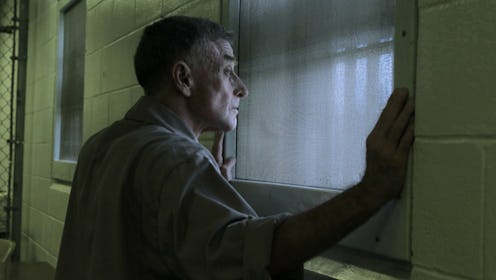Entertainment
Why Michael Peterson's Appeal Was Far From The End Of The 'Staircase' Saga

The Staircase seems to be never-ending. The series first premiered eight episodes in 2004, followed by two more in 2010, and will release three concluding episodes on Netflix on June 8, 2018. The first chunk of episodes covered the initial investigation into the death of Kathleen Peterson, but the 2010 episodes examine what happened in Michael Peterson's appeals and how Peterson managed to get a new trial after being found guilty of the murder of his wife and given a life sentence.
The elements of the Peterson case that made The Staircase such a compelling story are the same elements that made it such a confusing case in the courtroom. Michael Peterson had claimed that his wife, Kathleen Peterson, had died after falling down the stairs but, as ABC reports, the prosecution claimed that the amount of blood found on the walls, coupled with other details, including the fact that another woman from Peterson's life, Elizabeth Ratliff, died twenty years prior after a fall down a staircase and the discovery that Peterson was communicating with a male escort, indicated he may have been involved in his wife's death.
Those latter points, as well as other elements of character testimony, became the basis for arguments in Michael Peterson's Durham County Superior Court appeal, which argued that much of the information argued in the courtroom was actually irrelevant to the trial.
"This trial involved a seemingly simple question; did the State prove beyond a reasonable doubt that Kathleen Peterson was beaten, rather than injured in a fall," Peterson's appeal states, arguing that the mention of Elizabeth Ratliff's death, Michael Peterson's bisexuality, his financial status, and the investigation of Peterson's home computer were irrelevant.
The appeal lays out its case against the inclusion of each element, saying of Ratliff's death:
Whatever similarities may have existed between the circumstances of the death of Elizabeth Ratliff and Kathleen Peterson cannot obscure the fact that Defendant was not shown to have been responsible for the death of Elizabeth Ratliff. Without that crucial evidentiary link, the evidence from Germany had no relevance to the death of Kathleen Peterson sixteen years later.
The appeal also argues the prejudiced nature of the trial's discussion of Peterson's sexual orientation, saying:
The danger of unfair prejudice has not lessened in the years since Rinaldi to justify abdication of its ruling. One need only skim headlines about the battle over gay marriage, the exclusion of gay priests, and cases in which gay men are assaulted to see that a significant portion of the population stills harbors strong feelings about homosexuality, and that evidence regarding homosexuality risks tainting the ability of jurors fairly to view the evidence.
Despite the arguments, WRAL reports that in November 2007, the North Carolina Supreme Court turned down the appeal, with Justice Edward Brady writing for the court, "We conclude that, because the state presented overwhelming evidence of defendant's guilt, independent and separate from the tainted evidence, no reversible error occurred."
The court's claim that the state provided ample physical evidence that was not affected by character testimony lines up with statements that one of the jurors, Ann Pennington, provided to WRAL. Pennington claimed, "We never based our decision on Mrs. Ratliff." Two other jurors, Tonia Rogers and Paul Harrison, told WRAL, "It was enough to deal with at 1810 Cedar St.; we couldn't handle two cases."
While the appeal was overturned, Peterson would eventually be granted a new trial because of a failing of State Bureau of Investigation agent Duane Deaver, who a judge ruled had misled the jury about the nature of the bloodstain evidence in the case, per CNN. Michael Peterson would eventually take an Alford plea, per The News & Observer, in which a defendant maintains their innocence while admitting that the court has the right to convict them based on evidence. While Peterson may have preferred to have his appeal accepted and not be found guilty of his wife's death, the fact stands that he's a free man – which means he got at least part of what he wanted from his appeal.